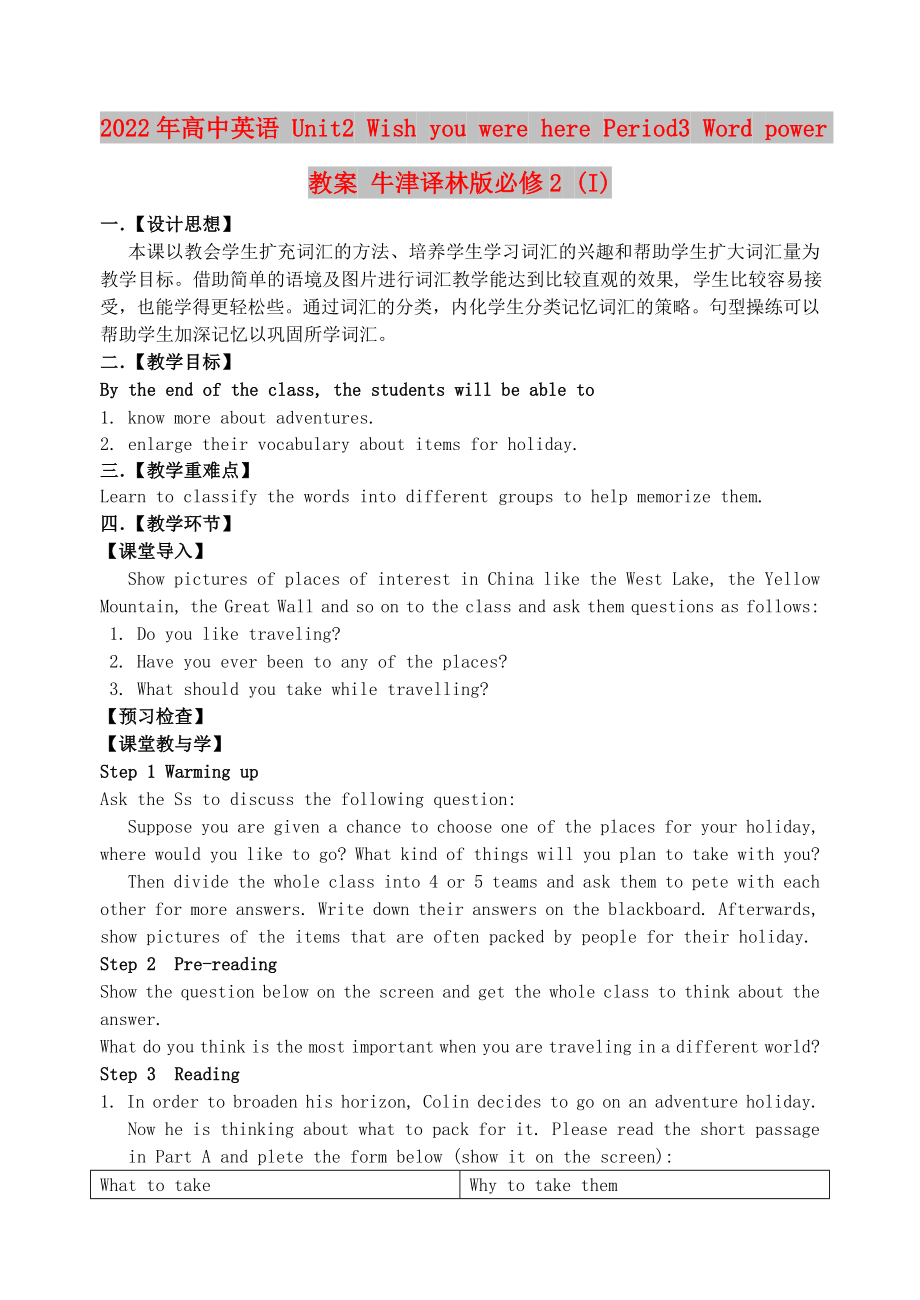《2022年高中英語(yǔ) Unit2 Wish you were here Period3 Word power教案 牛津譯林版必修2 (I)》由會(huì)員分享����,可在線閱讀,更多相關(guān)《2022年高中英語(yǔ) Unit2 Wish you were here Period3 Word power教案 牛津譯林版必修2 (I)(3頁(yè)珍藏版)》請(qǐng)?jiān)谘b配圖網(wǎng)上搜索����。
1、2022年高中英語(yǔ) Unit2 Wish you were here Period3 Word power教案 牛津譯林版必修2 (I)
一.【設(shè)計(jì)思想】
本課以教會(huì)學(xué)生擴(kuò)充詞匯的方法、培養(yǎng)學(xué)生學(xué)習(xí)詞匯的興趣和幫助學(xué)生擴(kuò)大詞匯量為教學(xué)目標(biāo)��。借助簡(jiǎn)單的語(yǔ)境及圖片進(jìn)行詞匯教學(xué)能達(dá)到比較直觀的效果, 學(xué)生比較容易接受����,也能學(xué)得更輕松些。通過(guò)詞匯的分類���,內(nèi)化學(xué)生分類記憶詞匯的策略��。句型操練可以幫助學(xué)生加深記憶以鞏固所學(xué)詞匯�。
二.【教學(xué)目標(biāo)】
By the end of the class, the students will be able to
1. know more about ad
2����、ventures.
2. enlarge their vocabulary about items for holiday.
三.【教學(xué)重難點(diǎn)】
Learn to classify the words into different groups to help memorize them.
四.【教學(xué)環(huán)節(jié)】
【課堂導(dǎo)入】
Show pictures of places of interest in China like the West Lake, the Yellow Mountain, the Great Wall and so on to the class and a
3、sk them questions as follows:
1. Do you like traveling?
2. Have you ever been to any of the places?
3. What should you take while travelling?
【預(yù)習(xí)檢查】
【課堂教與學(xué)】
Step 1 Warming up
Ask the Ss to discuss the following question:
Suppose you are given a chance to choose one of the places for your h
4��、oliday, where would you like to go? What kind of things will you plan to take with you?
Then divide the whole class into 4 or 5 teams and ask them to pete with each other for more answers. Write down their answers on the blackboard. Afterwards, show pictures of the items that are often packed by pe
5�、ople for their holiday.
Step 2 Pre-reading
Show the question below on the screen and get the whole class to think about the answer.
What do you think is the most important when you are traveling in a different world?
Step 3 Reading
1. In order to broaden his horizon, Colin decides to go on an
6、 adventure holiday. Now he is thinking about what to pack for it. Please read the short passage in Part A and plete the form below (show it on the screen):
What to take
Why to take them
2. Show pictures of the items to take by clicking the words in the column “what to tak
7���、e” so that the Ss will have a clear idea of them.
Step 4 Vocabulary-learning
All of the things mentioned are necessary for Colin’s adventure. In order to make his holiday fortable, safe and happy, Colin has also packed something else. Let’s find what they are.
Show the picture in Part B on the sc
8����、reen and talk about all the items and their usage with the whole class. Pay attention to Ss’ pronunciation of these words at the same time.
After that, ask the Ss to have a discussion in groups about which item would be the most useful for Colin and give the answer in the following sentence pattern
9�����、:
If I were Colin, I would never forget to pack_______, because I could use it to_____________.
Step 5 Vocabulary extension
Now do you think Colin is well equipped for his journey? Is he missing something really important? As his friend, Jennifer wrote an e-mail to him, reminding all the thing
10���、s that he should take to make his trip more enjoyable.
Allow the Ss 5 minutes or so to plete the e-mail individually.
Then, ask the Ss to recall the items that Jennifer advised Colin to take in the following way:
1) Show the picture with 8 “GUESS” on the screen, and then display all the ite
11���、ms by clicking the 8 “GUESS” one by one.
2) For the last item “a first aid kit”, ask the Ss this question:
What is it that Jennifer considers to be the most important for Colin’s adventure holiday?
Get the whole class to give the answer together:
Then, show the picture of a first aid kit on the
12、 screen and ask the question below:
What items are often included in a first aid kit?
Show pictures of all the 8 items in the box in Part D and ask the Ss to choose the 4 correct items.
Finally, check the answers with the whole class.
Step 6 Classification & Consolidation
Show the following wor
13�����、ds on the screen and ask the Ss to classify them into different categories.
flashlight; bread; cotton balls; fruit juice; boots; bandages; cap; pass; water purifying tablets; biscuits; aspirin, scissors
Group1: clothes
Group2: food
Group3: medicine
Group 4: tools
【課堂鞏固】
Allow the students 5 m
14�、inutes or so to plete the e-mail to Colin according to what they have learned in this lesson. Then check the answers with the whole class.
【知識(shí)小結(jié)】
根據(jù)不同需要安排不同形式的練習(xí),如表格形式的運(yùn)用��,使得閱讀任務(wù)更加清晰�����,有助于學(xué)生訓(xùn)練掃讀能力���,并幫助學(xué)生對(duì)所學(xué)詞匯語(yǔ)義層面的掌握�����。
【提升與拓展】
Suppose you are a reporter of the school newspaper, interview an experienc
15�����、ed traveler about taking adventure holidays. Write a short passage about that in about 150 words.
Meanwhile, offer the following English proverbs to the Ss to help with their writing.
① He who risks nothing gains nothing.
收獲與風(fēng)險(xiǎn)并存.
② No cross, no crown.
不經(jīng)歷風(fēng)雨,怎么見(jiàn)彩虹.
③ Success grows out of struggle to overe difficulties.
成功來(lái)自于克服困難的斗爭(zhēng).
【課后預(yù)習(xí)】
Grammar��。
五.【板書(shū)設(shè)計(jì)】
本課的重點(diǎn)詞匯�。
六.【家庭作業(yè)】
1. 識(shí)記本課的重點(diǎn)詞匯;
2. 完成語(yǔ)法導(dǎo)學(xué)案��。
 2022年高中英語(yǔ) Unit2 Wish you were here Period3 Word power教案 牛津譯林版必修2 (I)
2022年高中英語(yǔ) Unit2 Wish you were here Period3 Word power教案 牛津譯林版必修2 (I)

